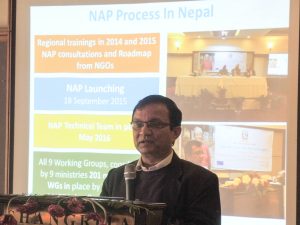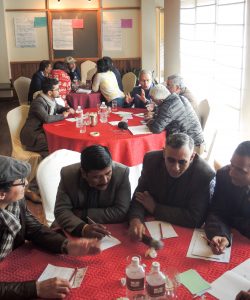
See also: Read the report Nepal’s National Adaptation Plan (NAP) Process: Reflecting on Lessons Learned and the Way Forward.
Last week in Kathmandu, over 30 government, civil society and media representatives gathered to reflect on Nepal’s NAP process to date, and to identify priorities for the way forward.
The workshop was opened by Ram Prasad Lamsal, Joint Secretary and Chief of the Climate Change Management Division in the Ministry of Population and Environment, who provided a status update on the process so far. Lamsal also highlighted some of the actions planned for the next stage of the NAP formulation process, which will be supported by readiness funding from the Green Climate Fund (GCF).
Angie Dazé, from the NAP Global Network Secretariat, provided an “outsiders’ perspective” on Nepal’s NAP process, highlighting its unique features and the key questions to be addressed in the upcoming phase. She shared examples from the NAP Global Network’s international community of practice on NAP processes to provide context for the discussions. Additional examples of adaptation mainstreaming and mechanisms for linking national and sub-national planning and action were shared by Aditya Bahadur of Action on Climate Today (ACT).

Participants discussed key issues that need to be addressed in the coming steps of the formulation phase. They acknowledged that the ongoing government restructuring represents both a challenge and an opportunity for the NAP process. The newly-formed provincial and local governments will be important actors in adaptation planning, implementation and M&E, and must have a role in the NAP process going forward. At the same time, the NAP process must create an enabling environment for them to develop and implement climate-resilient development plans. This next stage of formulation must prepare the foundation for implementation, taking into consideration financing issues and establishing systems for longer-term coordination, information sharing, and monitoring and evaluation.
Nepal has already demonstrated its commitment to addressing climate change through a range of policies and programs with adaptation at the centre. The NAP process represents an opportunity to consolidate this experience, to reduce vulnerability and enable the country to achieve prosperity despite the impacts of climate change.
The workshop was co-organized by Nepal’s Ministry of Population and Environment (MoPE), Action on Climate Today (ACT), Practical Action and the NAP Global Network.
Watch a video from NAP Nepal explaining the country’s NAP process.